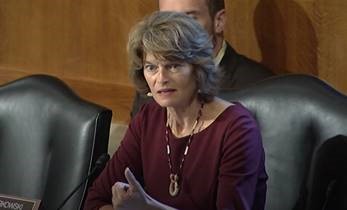Murkowski: Reducing Healthcare Costs
Alaskan Witness Testifies in Senate HELP Committee
As Alaska faces some of the highest healthcare costs in the nation, U.S. Senator Lisa Murkowski (R-AK) today participated in a Health, Education, Labor, and Pensions (HELP) Committee hearing to address ways to reduce healthcare costs, specifically focused on decreasing administrative spending.
The hearing featured Alaskan witness, Becky Hultberg, President and CEO of the Alaska State Hospital and Nursing Association, who testified on the obstacles hospitals and nursing facilities face in complying with federal regulations, including high costs and the impacts of administrative burdens. In addition, Hultberg explained the heightened costs imposed on small, rural facilities due to one-size-fits-all federal regulations.
“Why is it hard in a rural facility? Well imagine a rural facility with 11 beds and you have five surveyors that have to descend on your facility for a week. They are going to find things that you’re going to have to write up and address it’s a tremendous direct cost and as you said it’s a tremendous opportunity cost so we think that there should be one standard framework for surveys that is consistent across states,” said Becky Hultberg, “Again, our facilities welcome the opportunity to correct things related to patient care but many of these things are not. As an example we had a facility working really hard to serve culturally appropriate food to elders. They received a deficiency for serving too much fish.”

During the hearing, Senator Murkowski asked Hultberg whether making certain processes standardized across the industry and making sure electronic health records from different companies can communicate would be effective at reducing costs.
“In Wrangell we have eight beds, your staff is limited, and the requirements are as significant as they are in a major hospital in Seattle. The issue of scale and why a rural strategy is important recognizes that we’re just not equally situated, even with the inoperability in the full integration of electronic medical records,” said Senator Murkowski.
“We have to figure out this technology piece, also recognizing there may be other steps that we need to take to really enable us to have a rural healthcare infrastructure that is meaningful. As an example, Wrangell, this tiny medical center on an island is going to spend $65,000 this year on upgrades to meet stage three meaningful use. They are not going to see patient benefits with those dollars. They are having to purchase a software package with functionality they don’t need. And earlier this year they had 10 days left on cash on hand. So $65,000 in this committee room where you deal with billions of dollars may not seem like a lot, but for Wrangell medical center it’s really important. And for residents of that community, it’s really important,” said Becky Hultberg. “So one of the things that we encourage is revisiting our current framework for electronic health records, removing some of those barriers and ensuring that we have inoperability which was the promise of electronic medical records that has not been realized.”
During the hearing, Senator Murkowski questioned Becky Hultberg on rural healthcare strategy in light of a directive from the Centers for Medicare and Medicaid Services (CMS), noting the reality that rural Alaska is quite different from rural America.
“I sent a letter to Administrator Verma suggesting that there is no one rural lens, that a rural healthcare strategy needs to be a little bit broader,” said Senator Murkowski. “Can you speak to that aspect of it?”
“A rural hospital in Colorado might be 100 beds, and that’s considered rural. And then we look at a community like Wrangell where they have an eight-bed hospital plus some swing beds. So, the needs of those facilities are going to be very different,” said Becky Hultberg. “We appreciate CMS’ focus on rural and their desire to have a rural lens, to look at hospitals and other healthcare providers, but we think it needs to not just be single rural lens as you noted but that it really needs to consider the different geographies, the different patient populations, the different types of facilities. So, I think that the operative word there is flexibility. When you look at a state like Alaska our needs are going to be much different than a state like Iowa, so I think that there are many examples that I could point to of ways that CMS could take that philosophy, develop more flexibility, and then be more responsive to the needs of our communities, whether it’s the electronic health records, direct supervision, or other areas.”








